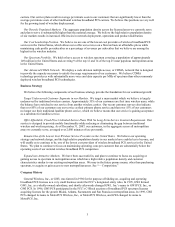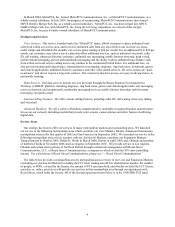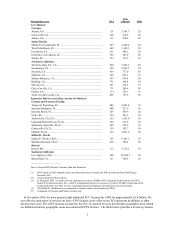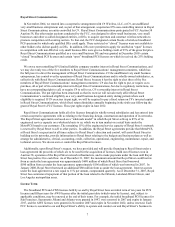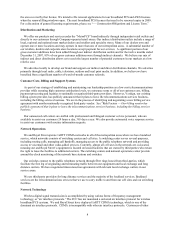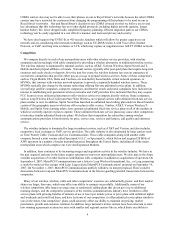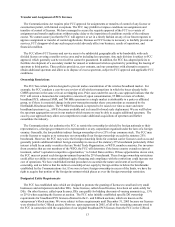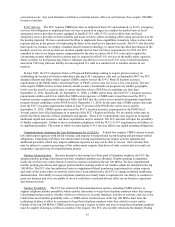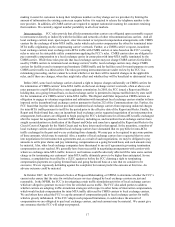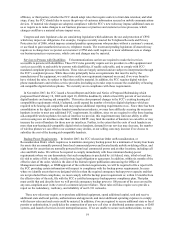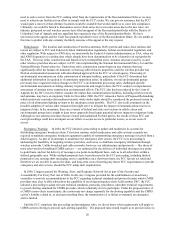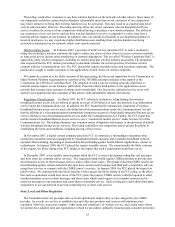Metro PCS 2007 Annual Report Download - page 24
Download and view the complete annual report
Please find page 24 of the 2007 Metro PCS annual report below. You can navigate through the pages in the report by either clicking on the pages listed below, or by using the keyword search tool below to find specific information within the annual report.13
Transfer and Assignment of PCS Licenses
The Communications Act requires prior FCC approval for assignments or transfers of control of any license or
construction permit, with limited exceptions. The FCC may prohibit or impose conditions on assignments and
transfers of control of licenses. We have managed to secure the requisite approval of the FCC to a variety of
assignment and transfer applications without undue delay or the imposition of conditions outside of the ordinary
course. We cannot assure you that the FCC will approve or act in a timely fashion on any of our future requests to
approve assignment or transfer of control applications. Because an FCC license is necessary to lawfully provide our
services, FCC disapproval of any such request could adversely affect our business, results of operations, and
financial condition.
The FCC allows FCC licenses and service areas to be subdivided geographically or by bandwidth, with each
divided license covering a smaller service area and/or including less spectrum. Any such division is subject to FCC
approval, which generally can be received but cannot be guaranteed. In addition, the FCC has adopted policies to
facilitate development of a secondary market for unused or underused wireless spectrum by permitting the leasing of
spectrum to third parties. These policies provide us, new entrants, and our competitors with alternative means to
obtain additional spectrum and allow us to dispose of excess spectrum, subject to FCC approval and applicable FCC
conditions.
Ownership Restrictions
The FCC has certain policies designed to prevent undue concentration of the wireless broadband market. For
example, the FCC conducts a case-by-case review of all wireless transactions in which the buyer already holds
CMRS spectrum in the same or in an overlapping area. Prior cases under the case-by-case approach indicate that the
FCC will screen a transaction for competitive concerns if, upon consummation, 95 MHz or more of cellular,
broadband PCS, enhanced SMR, and 700 MHz spectrum in a single market is attributable to a party or affiliated
group, or if there is a material change in the post-transaction market share concentrations as measured by the
Herfindahl-Hirschman Index. The 95 MHz benchmark is expected to be raised over time as more and more
broadband spectrum (e.g., AWS) becomes available and is cleared for broad scale deployment. We are well below
the spectrum aggregation screen in our markets which means we may be able to acquire additional spectrum. The
case-by-case approach may allow our competitors to make additional acquisitions of spectrum and further
consolidate the industry.
The Communications Act authorizes the FCC to restrict the ownership levels held by foreign nationals or their
representatives, a foreign government or its representative or any corporation organized under the laws of a foreign
country. Generally, the law prohibits indirect foreign ownership of over 25% of our common stock. The FCC may
revoke licenses or require us to restructure our ownership if our foreign ownership exceeds the statutory 25%
benchmark. However, the FCC may waive the foreign ownership limits for common carrier licensees such as us and
generally permits additional indirect foreign ownership in excess of the statutory 25% benchmark particularly if that
interest is held by an entity or entities that are World Trade Organization, or WTO, member countries. For investors
from countries that are not members of the WTO, the FCC will determine if the home country extends reciprocal
treatment, called “equivalent competitive opportunities,” to United States entities. If these opportunities do not exist,
the FCC may not permit such foreign investment beyond the 25% benchmark. These foreign ownership restrictions
could affect our ability to attract additional equity financing and compliance with the restrictions could increase our
cost of operations. We have established internal procedures to ascertain the nature and extent of our foreign
ownership, and we believe that the indirect ownership of our equity by foreign entities is below the benchmarks
established by the Communications Act. If we were to have foreign ownership in excess of the limits, we have the
right to acquire that portion of the foreign investment which places us over the foreign ownership restriction.
Designated Entity Requirements
The FCC has established rules which are designed to promote the granting of licenses to small and very small
businesses and entrepreneurs and other DEs. Some licenses, called closed licenses, have been set aside solely for
DEs. On other licenses, called open licenses, DEs can qualify for bidding discounts of varying amounts (e.g., 15%
or 25%) when acquiring the licenses at auction. The FCC rules initially established specific DE ownership
requirements for broadband PCS licenses obtained in the C- and F-Block auctions, which are known as the
entrepreneur’ s block auctions. We were subject to these requirements until December 31, 2005 because our licenses
were obtained in the C-Block auction. However, upon repayment in 2005, of all of the remaining amounts owed to
the FCC in connection with the acquisition of our original broadband PCS licenses from the FCC in the C-Block


